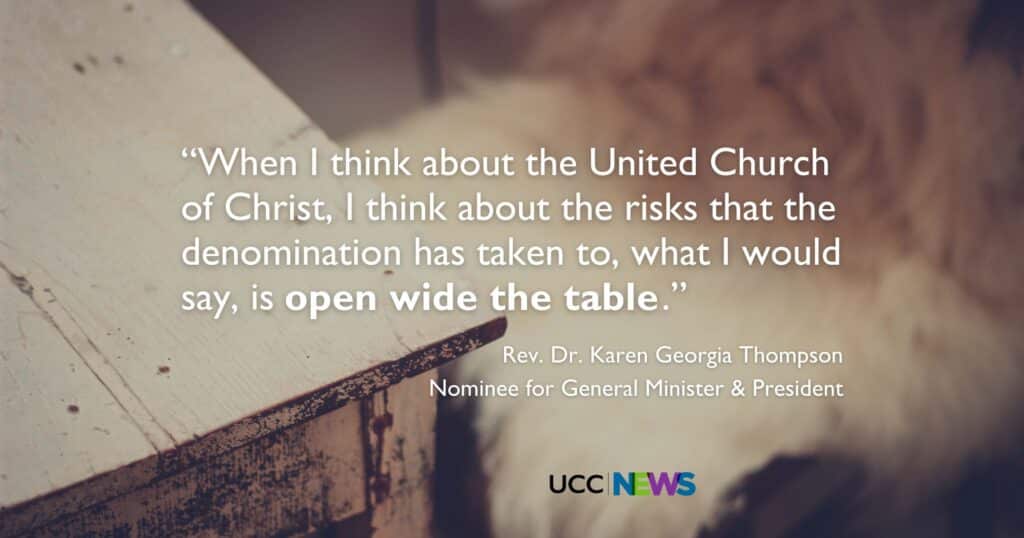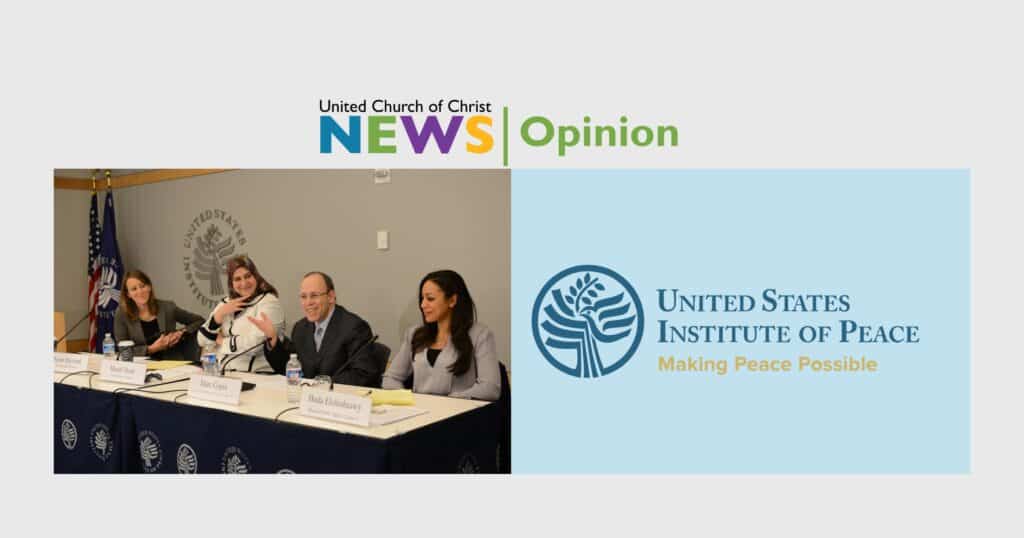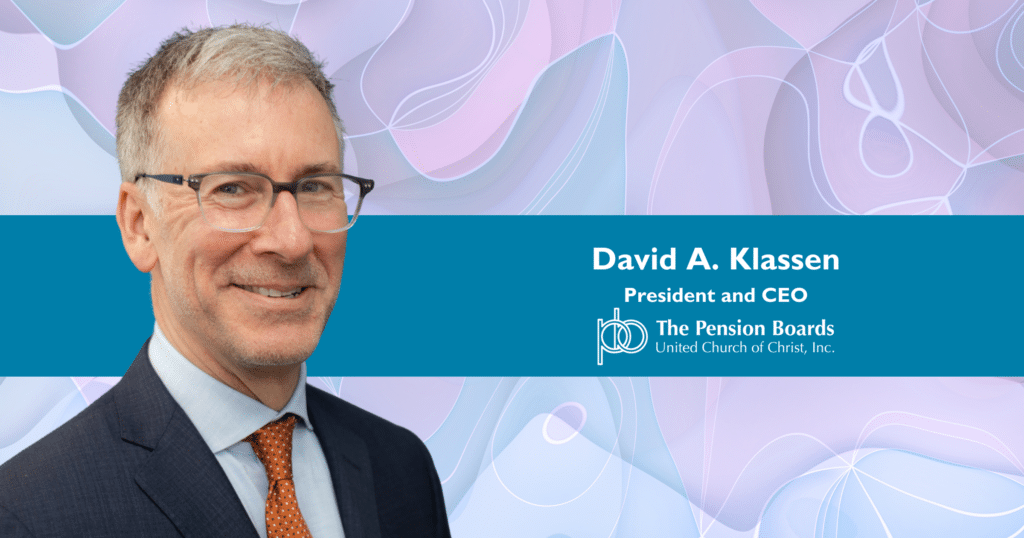Ahead of General Synod, GMP nominee Thompson shares ‘vision of hope’ for UCC
At the 34th General Synod of the United Church of Christ, June 30-July 4 in Indianapolis, the denomination’s national body will elect a new General Minister and President.
In February, the UCC Board’s search committee recommended the Rev. Karen Georgia Thompson, current Associate General Minister for Wider Church Ministries, as candidate for the UCC’s highest office. A few weeks later, the full Board affirmed this recommendation, voting to make Thompson the official GMP nominee.
Now, General Synod must decide if Thompson is to become the first woman – and the first woman of African descent — to lead the denomination.
During Synod, delegates will hear Thompson give a nomination speech at the June 30 plenary, have an opportunity to ask her questions during a “Meet the Candidate” session July 1 at 4:15 p.m. and ultimately will cast their votes, likely the morning of July 3.
To help delegates learn more about the candidate, search committee chair the Rev. Noah Brewer-Wallin recorded an interview with Thompson ahead of Synod, whose theme this year is “Making All Things New.”
A ‘vision of hope’
That theme, Thompson explained, was chosen with the accompanying text of Isaiah 43:18-19, but is actually a direct quote from Revelation 21:5.
“In the Revelation text … John is reflecting on the Isle of Patmos about, really, the oppression of the Roman Empire,” Thompson reflected in the interview. “And in this particular part of the chapter, it talks about a new heaven and a new earth and making all things new. And I don’t think it’s so much about throwing out the baby with the bathwater as much as it is imagining that there could be a different world possible, in the face of everything that people are experiencing.”
She called this verse of Revelation a “vision of hope,” in contrast to how the biblical book is sometimes perceived as disturbing and apocalyptic. This kind of hope in the present could be particularly important for envisioning the future and possibility of the Church.
“I wonder, 25 years from now, what would people say about us in this moment?” Thompson asked. “We look back and we say, ‘We’re a church of firsts.’ And I wonder, what are the firsts that are yet to come for us?”
Why the UCC?
Thompson has served the UCC National Setting in three different roles for more than a decade. Before that, she pastored a UCC church in Florida, later working in disaster response for the Conference.
But she wasn’t initially part of the denomination. In the video interview, Brewer-Wallin asked Thompson what brought her to where she is now, a leader within the UCC.
Thompson responded that, first and foremost, she came to the UCC for a very personal reason: because she wanted a safe place for her children. Part of that, she explained, meant a safe environment for her children to show up to church as themselves — as young people uncovering their burgeoning identities.
“I wanted them to have a safe space to explore who they found themselves to be in any of those given moments,” Thompson said. “I think, for me also, it was about finding space where I could be who I was called to be as a woman in ministry. So, it was balancing those out, vocationally and as a mother.”
She particularly recalled a watershed moment when one of her children came out to her. As Thompson tells it, they hesitated because they thought she would condemn them, since she was a Christian pastor.
“I think if anything has shaped my ministry, it was those 30 seconds of my life,” Thompson said. “And I don’t ever want to do ministry in a place or be a part of a space where my child or anybody else thinks that what I represent damns who they understand themselves to be as made in the image of God.”

Showing up for the marginalized
In the interview, Thompson spoke to another significant aspect of the UCC, at all levels: its commitment to extravagant welcome as an act of justice.
“When I think about the United Church of Christ, I think about the risks that the denomination has taken to, what I would say is, open wide the table,” she said.
Throughout the years, that has meant the denomination aligning with and accompanying different groups of people that have been marginalized and oppressed by society at large.
“That’s what justice looks like,” Thompson said. “It’s not just saying, ‘Oh, there’s injustice over there.’ It’s about being in solidarity, but also finding a way to alleviate suffering or injustice, however that looks.”
The UCC especially has become recognizable for its Open and Affirming covenant, supporting and advocating for the LGBTQ+ community. In that tradition, Thompson said that the Church can do more to support trans and nonbinary siblings, for example, who are “being targeted” in this moment in history.
“I think the United Church of Christ has done incredibly well around LGB,” she said. But, “there’s T, there’s Q, and I think we’re still negotiating what it means to show up in spaces, what it means to provide meaningful resources and programming, how to be stronger advocates.”

The United Church of Christ’s 34th General Synod will be held June 30-July 4 in Indianapolis. For programming, information and more, visit generalsynod.org.
Thus, to “show up” for marginalized communities can mean confronting injustice through Christian ministry.
“I think race continues to be a very divisive issue, to the point of death for people,” Thompson said. “And in the midst of that, we’re talking about the militarization of our cities and what reparations is going to look like. Those are places where the church needs to be present.”
National yet pastoral ministry
To aid local congregations in such ministry — and many other kinds — Thompson sees opportunities in what the UCC’s National Setting has to offer.
The National Setting provides numerous resources for churches “for today and for tomorrow,” she explained, from a wide variety of justice initiatives, interfaith relations and a host of other resources to help congregations connect to their communities and pursue their mission and vision.
Having previously served as the UCC’s racial justice minister and ecumenical officer prior to her election to AGM, Thompson said that pastoral ministry “still remains at the heart of how I understand my ministry, even in the National Setting.”
She recalled how, when she worked in disaster response for the Florida Conference, she often encountered such pastoral moments.
“There was something in being able to show up for people in a time of crisis and to provide practical and spiritual care,” Thompson said. “And so, being a pastor has never really left who I am. And I think that there are people in the National Setting who are ordained who would probably say the same as well, that there are many places in which we function in specialized ministries — in chaplaincies, in Conferences, in national ministry.
“But at the heart of that, I believe, is being able to provide care and hope and to bring God’s love to people who are experiencing challenges around a multiplicity of issues.”
To learn more, visit the GMP nominee update page on the Synod website here.
Content on ucc.org is copyrighted by the National Setting of the United Church of Christ and may be only shared according to the guidelines outlined here.
Related News
Send a prayer shawl along to General Synod 35
There’s been a buzz about Missouri, Kansas – can you hear it? It’s more of a clicking...
Read MoreOpinion: UCC pastor and former Institute of Peace Staffer calls for action in defense of peace
Editor’s Note: The United States Institute of Peace (USIP), an independent institute founded...
Read MorePension Boards appoints David A. Klassen as its President, CEO
The Pension Boards, an affiliated ministry of the United Church of Christ recently announced its...
Read More




